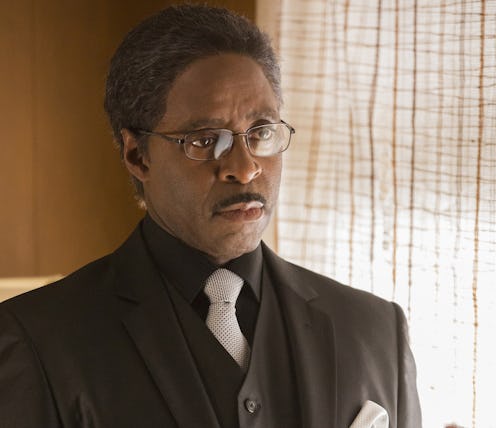Entertainment
What America Can Learn From 'The Immortal Life Of Henrietta Lacks'

The upcoming HBO film adaptation of The Immortal Life of Henrietta Lacks is a story of family and science, racism and ethics, discovery and healing. But, according to actor Courtney B. Vance, the true story of Henrietta Lacks can teach America a lesson that seems simple on the surface, but is absolutely revolutionary when you think about it.
"The story is about treating people the way they should be treated," he tells me, sitting at the edge of a couch at the London Hotel in New York. I'm facing him in an armchair that dangles my feet over the ground, which he warned me when I sat down was an uncomfortable seat. "That should be common sense, but it’s very uncommon now. The world has turned topsy turvy, and everyone is out for themselves. It shouldn’t be like that."
In Henrietta Lacks, the actor plays Sir Lord Keenan Kester Cofield, a con artist who masquerades as a lawyer and ruins both the Lacks' credibility and their ability to trust anyone else offering to help them. Cofield's lies are just another blow against a family that, according to Vance, was "harmed in the name of science." The actor was struck by the casual disregard for the Lacks family that the scientists, and figures like Cofield, displayed. "People are people," he says. "And everyone is worthy of respect. This family, and the people, were disrespected, and it’s happened many times." This particular point really seems to stick with Vance. Earlier in the conversation he was thoughtfully gazing out at nothing, but with this point, he meets and holds my gaze: "That’s not right, and they know it’s not right."
It's an incredibly moral stance for the actor who is best known for portraying the controversial figure of Johnnie Cochran on People vs. O.J. But these real-life injustices are exactly the kinds of stories that Vance believes the world needs to hear — stories like the one that Henrietta Lacks tells.
"This one is extraordinary to me. We’re talking about the experimentation on people, and that is not right," he says, his eyebrows furrowing as he stares at me, as if to make sure that I really understand. "In what world is that OK? That’s what needs to be explored. How do we get in our minds that it’s okay to do things to ourselves? Because when you do things to people, you do it to yourself. How do we go someplace in our minds that, in your minds, you say 'They’re less than human, so we can do what we want to to them, and it’s OK.'"
When Donald Trump signs an executive order restricting certain refugees from entering our country; when United Airlines drags a passenger off a flight against their will due to an overbooking; when the decision is made to do a series of airstrikes on Syria, it can be easy to think all of these things are unrelated. But they all harken back to the exact same concept of failing to stop, think, and empathize with other people.
"Stop the tape. Step back. Take a deep breath," Vance advises. "What is the problem? Where are we? Who are we now? We just need to slow down and talk it through, before you press that button and create a whole different world... That’s what we need in these positions of power and influence: someone who’s willing to stand there long enough to figure out what’s going on, so we don’t go down that rabbit hole that you can’t come back from. And that," he finishes. "Is what this movie is about."
So, yes, the upcoming HBO film adaptation of The Immortal Life of Henrietta Lacks is a story of family and science, racism and ethnics, discovery and healing. But it's also a story that shows how far a little bit of compassion, of listening, of empathy can go toward bridging the gaps that separate us from each other, our families, and ourselves. And it's definitely a story that every American could benefit from hearing in these tumultuous times.